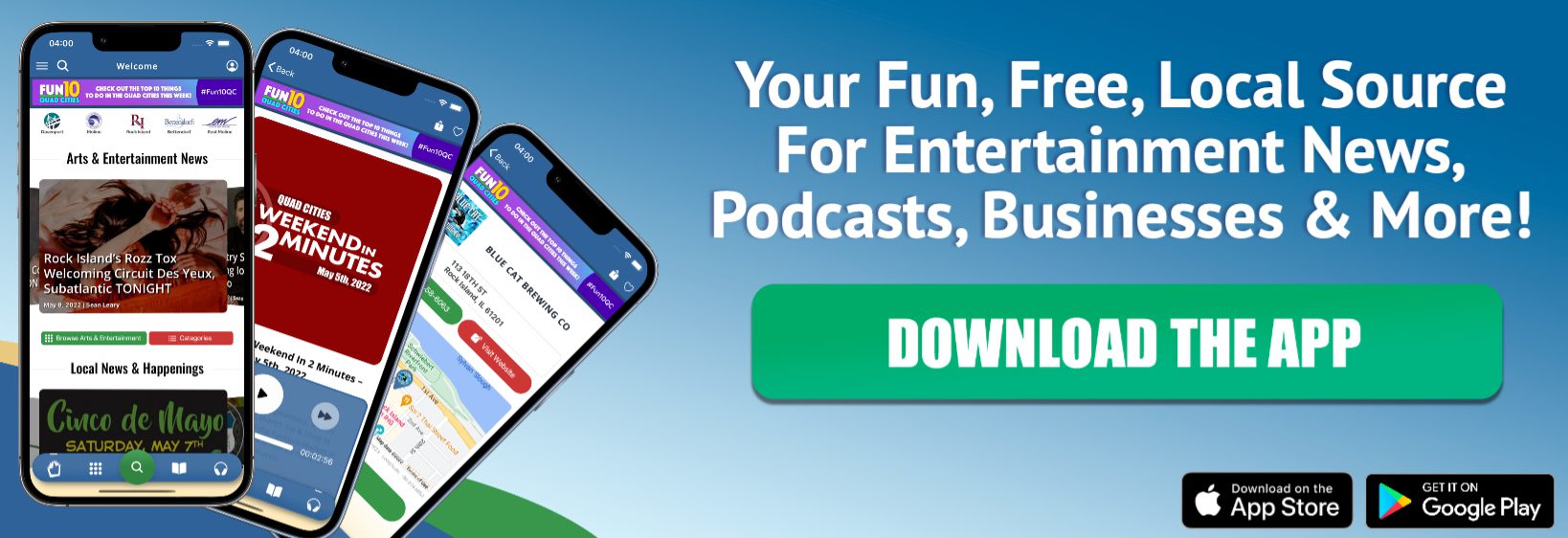St. Ambrose Pianist to Solo This Weekend With Quad City Symphony
Pianist Marian Lee – head of the keyboard area at St. Ambrose University, Davenport – has found silver linings in the dark cloud of Covid.
For just the second time since she’s been in the Quad-Cities, over the past eight years, Lee will be featured soloist with the Quad City Symphony Orchestra this weekend, performing J.S. Bach’s Keyboard Concerto No. 5 in F Minor (BWV 1056). That wasn’t the original plan.
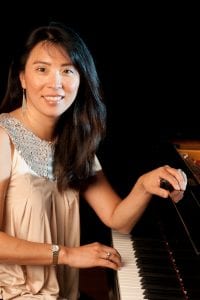
Pianist Marian Lee will solo this Saturday with the Quad City Symphony Orchestra.
“Because of Covid, I lucked out. The original pianist who was scheduled to perform was a Chinese pianist from Curtis and she was still unable to get back into the United States from China,” Lee said Wednesday.
Before Covid, the QCSO originally planned the Prokofiev Second Piano Concerto for the November concert, and QCSO concertmaster Naha Greenholtz was scheduled to do the Beethoven Violin Concerto this month, paired with the big Mahler First Symphony.
In the major shift, Greenholtz was moved to November, with Lee and Bach on this month’s bill with the Beethoven Symphony No. 3 (the “Eroica”), to be performed Saturday night at the Adler Theatre, with no audience present.
“They had to change the format of their concerts to not have intermissions, so all their concerts had to be reformatted to fit an hour’s length, to keep the audience members safe,” Lee said of this season’s first Masterworks concert in October and each one since.
“They had the Eroica scheduled, which is 50 minutes in itself, so they needed something short,” she said of this Saturday. “The Bach concerto fit that need perfectly, since it’s no more than 10 minutes.”
She was asked to sub in three months ago, compared to a year’s notice with a typical symphony concert series.
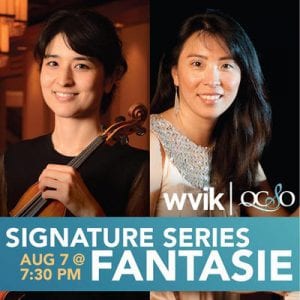
Lee and QCSO concertmaster Naha Greenholtz partnered in a concert at SAU in August.
Having Covid and the reduced, socially-distanced orchestra gives the QCSO an opportunity to do smaller pieces that people normally wouldn’t hear. The local orchestra has never performed a Bach keyboard concerto in its 106-season history.
“That’s why I was so thrilled and I believe the maestro is as well,” Lee said of conductor Mark Russell Smith. “Normally, they wouldn’t consider doing something like this. You have this big orchestra and you want to take advantage of it, with big orchestral works.”
“In a couple ways, I really did luck out, in that I get to premiere their first Bach keyboard concerto and I get to play again with them,” she said. “In an odd way, Covid has offered me opportunities I may not have gotten otherwise.”
The Bach concerto features a small string ensemble, with no wind or brass players.
Lee has done one prior piano concerto with the QCSO, the Mozart No. 21 in C Major, in 2015. “That was an unforgettable experience,” she said.
The next concert – to be videotaped for digital access starting Sunday at 2 p.m. for 30 days — will also offer Bach (1685-1750) on a modern piano, with a sound the Baroque composer never envisioned, the pianist said.
“I feel if Bach were alive today and could hear the incredible pianos that we possess now, he would have definitely written for and approved of using the modern-day piano such as a Steinway or Yamaha,” Lee said.
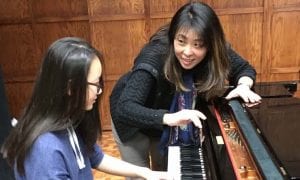
Lee has taught piano at St. Ambrose University since 2012.
“This is something my teacher at Juilliard and I talked about at length about, playing Bach on a piano. We both had no doubt that he would have chosen the piano over the harpsichord, had he had our modern instruments.”
She earned her bachelor’s and master’s in piano performance at New York’s prestigious Juilliard School, and was awarded the coveted Fulbright Grant to study at the Moscow Conservatory in what was then the Soviet Union. During her three-year stay, Lee witnessed the fall of the Soviet Union and toured extensively within the former USSR. Upon her return to the U.S., Lee completed her doctoral degree at the Peabody Conservatory of Music at The Johns Hopkins University.
She made her New York City debut at Carnegie Hall’s Weill Recital Hall as winner of the Artists International Award and has appeared as soloist and with orchestra internationally in Austria, Belgium, Italy, France, Norway, Russia, Azerbaijan, Turkmenistan, Poland, Brazil, Estonia, Hong Kong, and Thailand, as well as in Lincoln Center, the Kennedy Center’s Millennium Stage, Seattle’s Benaroya Hall, Moscow’s Tchaikovsky Hall and Rachmaninoff Hall, and the Hermitage Winter Palace in St. Petersburg, Russia.
Lee has given numerous world and U.S. premieres by contemporary composers from Russia, France, the Baltic republics and the U.S. Notable professional activities include violin and piano duos with Philadelphia Orchestra concertmaster David Kim, Milwaukee Symphony concertmaster Frank Almond, and Naha Greenholtz, concertmaster of Madison and Q-C orchestras. She’s also held master classes in Hong Kong, Delaware, Louisiana, Alabama, Illinois and Iowa.
Lee previously taught at the University of Iowa and the University of Delaware before moving to Davenport in 2012, where she is currently an associate professor in piano at St. Ambrose.
A busy, different 2020
Because of increasing cases of Covid-19 in the area, the QCSO decided at the start of November to move to all-digital concerts for the remainder of November and December.
Orchestra executive director Brian Baxter said their coronavirus task force has been closely monitoring the local Covid epidemic and reviewing guidance from government authorities at the federal, state, and local levels.
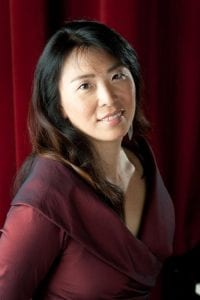
Lee was trained at the prestigious Juilliard School and Peabody Conservatory.
“We’ve been consulting with the Scott County Health Department since this whole thing began, to try to make sure we’re following best practices, doing the right thing – both for our own musicians and staff, as well as our patrons, to try and make things as safe as possible,” he has said.
“November, December here is no different, we’re still consulting with them. And the nature of the local epidemic and alarming increasing hospitalization rate is what led to this decision,” Baxter said. “So it was a recommendation by the Scott County Health Department, and we feel that it’s important for us to be partners with them, and to listen and follow those recommendations.”
Performing without a live audience won’t be a big drawback, Marian Lee said Wednesday.
“As a pianist, we so rarely get asked to play with an orchestra – it’ll be wonderful just to be able to play with a live string ensemble,” she said. “That, for me personally, is going to be exciting enough, especially the high-quality caliber of the Quad City Symphony Orchestra, and having an incredible conductor, Mark Russell Smith.
“He’s an incredible conductor – simply the best at what he does. He has so much respect for the artists and will follow the artists impeccably,” Lee said. “Of course I am missing the live audience. I want all my friends and all the subscribers, I feel so badly they can’t experience it live.”
She praised the QCSO and its coronavirus task force, in how they have adapted in a difficult year. Lee was among the 2,000 in attendance at LeClaire Park for a very different Riverfront Pops concert Sept. 12.
“That was amazing,” she said. “I loved it, because they had these pods. You didn’t have to scope out your place hours in advance. Your group could go straight to the pod and I felt very safe. It was very convenient, so well run. I have to give it to all the staff for doing such an incredible job with that. There was a great turnout. I really have to take my hat off to this organization.
“They have really kept the music going; they’ve done a phenomenal job,” Lee said. “And these livestream events are not cheap to produce. So,
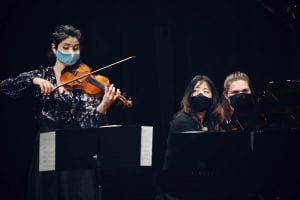
Violinist Naha Greenholtz and pianist Marian Lee performed at Galvin Fine Arts Center in August.
I hope the audiences show up and actually watch, and purchase tickets. By keeping the music going, it costs money and I hope our community supports them.”
“I am very fortunate that I teach at St. Ambrose University and that I am able to continue to work,” she said, contrasting with full-time musicians, who must live gig to gig (many also teach).
“Thankfully, a lot of students who take private lessons have continued on; I know mine have,” Lee said. “This is an activity they can do at home safely. I am grateful I have been able to teach privately.”
SAU switched to all online instruction two weeks before Thanksgiving, as Covid cases were rising in the region.
Lee said the transition to online teaching in the spring was hard, but it ended up great.
This fall semester, she has taught in person as much as possible, with safety precautions like masks and distancing. The classes were small and it was very doable, Lee said.
“Even with private piano lessons, I didn’t have a single student that got sick due to all the precautions we took,” she said.
The March 2020 QCSO Signature Series concert of chamber music was postponed to early August at the main auditorium in Galvin Fine Arts Center at Ambrose. Lee and Naha Greenholtz (a frequent collaborator) performed while masked.
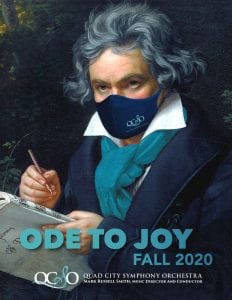
Greenholtz performed the Beethoven Violin Concerto with the QCSO last month.
“That was fun and exciting,” Lee said. “Because it was our first time trying to do a livestream, for everyone – for QCSO, for me and Naha. We also did manage to have a small live audience of 50 people. This is a hall that seats well over 1,000, so we knew we were safe. We could be very distant from each other.”
In honor of this year being the 250th anniversary of Beethoven’s birth, they performed an October concert at the Figge Art Museum, also with a very small audience and livestreamed as well. “That was very popular and went really well,” Lee said. “I was just happy that we were able to pay some tribute to Beethoven and the 250th birthday.”
That Signature Series program featured Mozart’s Sonata in G Major, followed by Jesse Jones’ “Scherzo” (after Beethoven), inspired by the rapid-paced aspects of Beethoven’s music, and closed with Beethoven’s mysterious and passionate Sonata No. 7 in C Minor.
SAU has an informal series of “Casual Classics” concerts in the smaller Madsen Hall at Galvin, and Lee organized a Beethoven celebration last month, that featured the music faculty in seven pieces. They pre-recorded it and offered it online, including Beethoven’s chamber music and solo piano music.
“His string quartets are performed a lot, but not a lot of his early chamber music for other ensemble pairings,” Lee said.
It’s thrilling for her to be part of the worldwide Beethoven 250th celebrations, exposing people to some lesser-known works, compared to the famous symphonies, concerti and sonatas.
“I had to do a lot of research for that program and I wanted to feature as much of our incredible faculty as possible,” Lee said of November’s SAU concert. “I wanted to get as many different instruments in there as possible.”
“It had to be small groups, because of the whole Covid situation,” she said. The program included a clarinet trio, a piano quartet and a tenor song. One beautiful nocturne was transcribed for saxophone by SAU’s Ryan Smith.
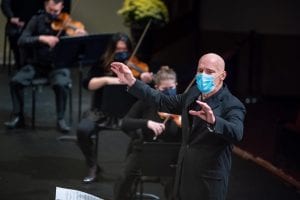
Music director and conductor Mark Russell Smith leading the QCSO.
“While I have to admit his earlier works are not as sophisticated as his piano sonatas or the symphonies, piano trios or violin sonatas,” Lee said, “you can see the seeds of his later works in the earlier works, and that’s fascinating. For instance, there’s a part of the Beethoven Piano Concerto No. 3 in the piano quartet. It’s really bizarre to see it there.”
“It’s another way to understand Beethoven on a deeper level, in terms of his progress as a composer,” she said. “He didn’t come out of the womb being able to make the Symphony No. 9. It was a process and it took his whole life to get there. That was fascinating to discover.”
Even though the Covid numbers are high in the Q-C, they’re still recording the concert Saturday at the Adler with no live audience, as was done for the November Masterworks concert (featuring Greenholtz playing Beethoven’s Violin Concerto).
“I’ve been able to perform, which is kind of amazing,” Lee said. “I know a lot of my colleagues haven’t been able to, because other places have shut down.”
“During this time of Covid, most places have canceled all their concert series, especially the big arts organizations,” she said. “I have to applaud the Quad City Symphony Orchestra, which has been amazing at keeping their concert season alive and going. They’re very determined.”
Offering digital access anywhere in the world
Due to Covid, the QCSO also has the opportunity to reach more people than normal, since their videos are available for 30 days for anyone with an Internet connection – this weekend’s through Jan. 6, 2021.
“Another odd positive twist to this, is for the first time my family can watch me online – from Columbus, Ohio, L.A. and New York,” Lee said. “The audience may have a better seat in the house than they normally do. They have cameras that I imagine will show my hands on the keyboard.”
“I’m excited to see how many people it will ultimately reach,” Lee said. “This way, they don’t have an excuse. They can watch it anytime. They can watch it in bed, in their pajamas. They can watch it outside in their yard.”
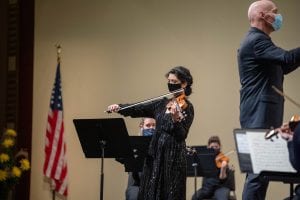
Greenholtz performed the Beethoven Violin Concerto with the QCSO last month.
“If it were not for Covid, perhaps an arts organization like the QCSO or even our music department would not have gotten into livestreaming events – I have to give full credit to Dr. Nick Enz, our band director, who’s really gotten our department into livestreaming,” she said of SAU. “He’s helped kept music alive at St. Ambrose, and made it so our seniors can still give their graduation recitals to a virtual audience.”
Without the pressure of Covid and people finding technological ways to keep the music going, many artists likely would not have made the music available online, Lee said.
“Universities like ours have discovered that this is actually a good thing — maybe we need to keep a lot of this going, even if we are able to come back to class,” she said. “I have a feeling that this is something they’re going to be continuing. Higher education and the arts – this is part of a new reality, I think, even when things get back to — quote — normal.”
Wearing masks while performing is something artists get used to, Lee said.
“It’s more distracting for the viewers,” she said. “You’re covering half your face and your face does emote. But at the same time, ultimately it’s the music that’s pouring out of our bodies into our instruments that is important. I don’t think it affects the actual musical sound. It may affect the visual experience a little bit.”
The Bach’s actual musical sound also will be different than when he wrote seven harpsichord concertos in the 1730s. “Although we know little about exactly when and how they were used, we know enough about these years in Bach’s life to place them in some kind of context,” composer Jacob Bancks wrote for the QCSO program.
“Beginning in 1723 and lasting until his death over a quarter century later, Bach worked as music director of the Thomaskirche in Leipzig,
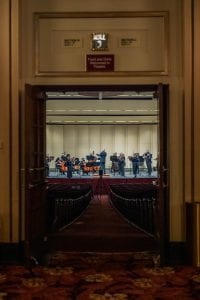
Recording the November Masterworks concert at the empty Adler Theatre, Davenport.
making overseer to music programs in four city churches and St. Thomas’s school.
“So much outstanding sacred music dates from this period — hundreds of cantatas, the Mass in B Minor, and the St. Matthew and St. John Passions — that it can be easy to forget that Bach continued in these years to compose instrumental music for non-liturgical contexts as well,” the program says. “In 1729, he was appointed director of the privately-run Leipzig Collegium Musicum, which had been founded by Georg Philip Telemann a generation prior.”
“It is reasonable to guess that Keyboard Concerto No. 5 in F Minor, BWV 1056, with various elements drawn from Bach’s earlier works, assumed its surviving form for use by this ensemble. What we do not need to guess is whether Bach ever played this concerto on the piano; to this we give a definitive ‘no.’”
An early piano-maker, Gottfried Silbermann, took great offense when Bach tried out one of his instruments in 1736 (around the time he composed the F minor concerto) and offered mostly negative feedback, regarding the instrument as “too weak in the high register and too hard to play,” Bancks wrote.
“Though wounded by his comments, Silbermann responded to Bach’s criticism by incorporating various improvements, and Bach seems to have been happier with later models. He perhaps did not envision the extent to which the piano would displace the harpsichord over the 50 years following his death, but his practical nature and love of instrumental color would almost certainly have led him to embrace the performance of his keyboard music on the modern piano,” the program says.
Lee says she’s kept busy on the instrument through the virtually the entire run time of the concerto.
The Beethoven Symphony No. 3 (“Eroica” or heroic), premiered in 1805 and was last done by the QCSO in 2016.
The program says it is “considered enormously pivotal in the history of the symphony.”
Prior to Haydn, symphonies were “essentially opera overtures, easily interchangeable and rarely of great length or expressive gravity,” Bancks wrote. “Haydn (with his 104 symphonies) and Mozart (with 41) contributed greatly to the elevation of the genre, but from Beethoven onward, few composers would write symphonies numbering in double digits. Beginning with Eroica, symphonies became loftier, longer, and more serious in nature, a vehicle for composers to display their most stirring and profound orchestral writing.”
Ludwig van Beethoven was born Dec. 17, 1770 and died at age 56 in 1827. The QCSO kicked off its Masterworks season in October with the small-ensemble Beethoven Symphony No. 1, when the Adler welcomed the public back for its first event since early March. The Oct. 3-4 concerts drew 250 people on Saturday night and 150 for Sunday.
For the first time, the orchestra provided digital access to its Masterworks concerts for 30 days (until Nov. 2 for the first one) for $40 per household.
The digital access for the Beethoven Violin Concerto program is available until Dec. 8. To purchase tickets to the Dec. 5 performance, visit qcso.org. For more information, call 563-322-7276.




